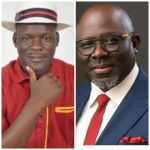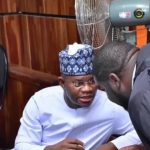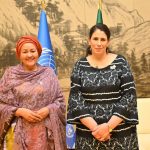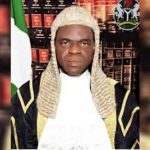“The Soul of a Nation”
Under President Tinubu.
By: Bala Salihu Dawakin Kudu Democracy Newsline Newspaper.
July 6th 2025.
In the heart of West Africa lies Nigeria — a country rich in culture, blessed with breathtaking landscapes, abundant natural resources, and a vibrant, resilient people. From the bustling streets of Lagos to the tranquil hills of Jos, from the oil-rich Delta to the Sahelic plains of the North, Nigeria’s diversity is not a burden but a treasure. This is a land that echoes with ancient wisdom, heroic struggles, and untapped potential. But beneath this beauty lies a troubling reality — a nation at a crossroads, weighed down by corruption, insecurity, poverty, and a political system that too often betrays the will of the people.This is not the Nigeria that its people dream of. This is not the Nigeria they deserve.
It was election season once again. Markets bustled, posters were plastered across every corner, and politicians with slick tongues paraded through communities making promises they had no intention to keep. With a bag of rice here and a few naira there, they bought not just votes—but futures.
In a small town in Kogi State, 21-year-old Amina watched as a local political agent handed out cash in exchange for voter cards. “It’s just ₦5,000,” she whispered to her friend. “But if we don’t take it, someone else will.” Her voice trembled with uncertainty. What seemed like a practical choice was, in truth, a betrayal of the very future she hoped to build—a future with education, employment, and dignity. Amina, like many Nigerians, stood on the thin line between conscience and desperation. But as her grandfather once said, “When you sell your vote, you sell your voice—and silence cannot build a nation.”
In the midst of this political chaos, a movement began to rise — not from the offices of governors or senators, but from the streets, universities, markets, and homes of everyday Nigerians. They called themselves The True Democrats — a political pressure group made up of principled, passionate, and patriotic Nigerians who believed in a democracy powered by the people, not politicians’ wallets. The group wasn’t driven by ethnicity, religion, or region. Their mission was simple: to awaken the Nigerian conscience.
They launched awareness campaigns in villages and cities, aired radio programs in local languages, distributed flyers, and held town halls with one message: Do not sell your vote. Your vote is your power. Young people led the charge — bloggers, artists, activists, and even comedians used their platforms to spread the message. They understood that true democracy is not about waiting for saviors, but about shaping the nation with their own hands and hearts.
In a country where political endorsements often came from backroom deals and party loyalty, a different voice rose—one that stirred the conscience of Nigerians. Senator Ali Ndume, a veteran of the National Assembly and a ranking member of the ruling party, publicly distanced himself from the endorsement of President Bola Ahmed Tinubu for a second term. “It is not time for coronations,” Ndume said. “It is time for accountability.”
His courage echoed across the nation. He reminded Nigerians that even with all the support and endorsements President Goodluck Jonathan received in 2015, the people chose otherwise because they voted with conscience, not cash. “Endorsements are not votes,” Ndume warned. “History has taught us that the people are the final deciders.” And so, his boldness became a symbol that within the political class, there still existed men of principle who valued truth over blind loyalty.
By May 2025, when 22 APC governors unanimously endorsed President Tinubu for a second term, Nigerians had grown weary. The cost of living was unbearable, fuel prices soared, insecurity remained rampant, and unemployment had become a nationwide affliction. While those in power praised progress, the streets told another story.
From Kano to Calabar, Port Harcourt to Sokoto, Nigerians began to ask tough questions. “What has been done in the six geopolitical zones?” “Where are the roads, the hospitals, the schools?” “Why are we being told to endorse when we should be seeing results?” Communities began holding their leaders accountable. The spirit of The True Democrats began to catch fire. It was no longer about parties or personalities. It was about principles.
The people remembered the words of democracy:
“In a true democracy, citizens don’t beg leaders. Leaders serve the people.”
Nigerians began rejecting the peanuts offered during elections and demanded the full buffet of justice, development, and dignity. Women organized voter education programs. Youths campaigned against vote buying. Religious leaders preached accountability from their pulpits. Traditional rulers urged their people to vote with their heads and hearts, not their stomachs.
“As the 2027 elections approached, the message was clear: No more selling votes. No more silent suffering. No more recycled promises”.
“The ballot became sacred again. Not just a paper slip, but a sword of justice”.
Nigeria may still be battling economic hardship, political betrayal, and widespread disillusionment. But in the hearts of millions, something new was rising awareness. Change was no longer a slogan; it was a lifestyle. Because the people finally understood:
It’s a right fought for, protected, and practiced by the people, The Nigeria they dreamed of was no longer an illusion, It was a promise — and that promise rested in their hands, Let the conscience of Nigeria speak louder than corruption and Let the votes of Nigerians shape a nation they truly deserve.
“Enough is enough”.
Bala Salihu Dawakin Kudu, Democracy Newsline Newspaper.
Contact: 08060017934












